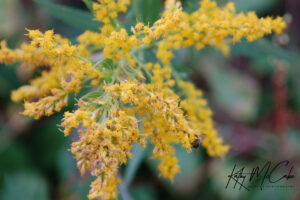I have goldenrod! I’m so glad we do too because it’s very medicinal. Just be careful if you’re sensitive to plants in the Asteraceae family. The following is generated via ChatGBT using my terms and terminology but I love how it writes! 🙂 And it can make my handwritten jumble of notes into an interesting article!
The Medicinal Benefits of Goldenrod: Nature’s Healing Elixir
Goldenrod (Solidago spp.) is a vibrant and prolific wildflower known for its beautiful golden-yellow blooms that paint the landscape in late summer and early autumn. Often wrongly accused of causing hay fever due to its flowering period coinciding with allergy season, goldenrod is, in fact, a valuable medicinal plant with a rich history of use in herbal medicine. This article explores the numerous medicinal benefits of goldenrod, supported by scientific sources and traditional wisdom.
Botanical Background
Goldenrod is a perennial plant that belongs to the Asteraceae family, which includes sunflowers and daisies. There are over 100 species of goldenrod, with Solidago virgaurea and Solidago canadensis being the most well-known. These plants are native to North America and Europe, though they can be found in various regions worldwide.
Medicinal Properties
Goldenrod is a treasure trove of medicinal properties, and its benefits have been recognized for centuries. The most notable medicinal properties of goldenrod include:
Anti-Inflammatory: Goldenrod is known for its potent anti-inflammatory properties, which can help alleviate conditions such as arthritis, gout, and muscle pain.
Diuretic: This herb stimulates the kidneys and urinary tract, promoting the removal of excess fluids and waste from the body. This diuretic effect can be helpful for those with urinary tract infections, kidney stones, and edema.
Antioxidant: Goldenrod contains antioxidants that help protect cells from oxidative damage. This may reduce the risk of chronic diseases and support overall health.
Antimicrobial: Goldenrod has shown antimicrobial properties that can be effective against various bacteria and fungi. It may be used topically to treat wounds and skin infections.
Immune Support: Some studies suggest that goldenrod may help enhance the immune system’s response to infections and illnesses.
Allergy Relief: Contrary to popular belief, goldenrod can actually help alleviate allergies. It is primarily an insect-pollinated plant and does not release pollen into the wind, reducing its potential to cause hay fever.
Drink a tea of goldenrod with honey to soothe your throat.
Scientific Evidence
Several scientific studies have explored the medicinal benefits of goldenrod:
Anti-Inflammatory Effects: A study published in the Journal of Ethnopharmacology (2016) found that goldenrod extracts exhibited significant anti-inflammatory activity, making it a potential natural remedy for inflammatory conditions.
Diuretic Properties: Research published in the Journal of Ethnopharmacology (2002) confirmed goldenrod’s diuretic effect, suggesting its usefulness in treating urinary tract disorders.
Antioxidant Activity: A study in the Journal of Agricultural and Food Chemistry (2012) demonstrated the presence of potent antioxidants in goldenrod, which may help protect against oxidative stress.
Antimicrobial Potential: Goldenrod has been investigated for its antimicrobial properties against various pathogens, as shown in a 2014 study published in the International Journal of Pharmaceutical Sciences and Research.
Traditional Uses
Goldenrod has a long history of use in traditional medicine, particularly among Native American and early European settlers. It was used for ailments such as colds, flu, wound healing, and kidney health. Goldenrod tea was commonly brewed to address many of these health concerns.
Safety and Precautions
While goldenrod offers various medicinal benefits, it is essential to use it cautiously. Consult a healthcare professional before using goldenrod, especially if you have allergies, are pregnant or nursing, or are taking medications. Individuals with a known sensitivity to plants in the Asteraceae family (such as ragweed) should approach goldenrod with caution.
Conclusion
Goldenrod, often misunderstood as an allergen, is a remarkable medicinal plant with a wealth of benefits. Its anti-inflammatory, diuretic, antioxidant, and antimicrobial properties make it a valuable addition to your natural medicine cabinet. While scientific research supports many of its traditional uses, always consult with a healthcare professional before incorporating goldenrod into your wellness routine. With proper guidance, you can harness the healing power of this beautiful wildflower for a healthier, more vibrant life.
Sources:
Sena, L. A., Derksen, A., Davidson, R., Haneline, L., & Sapi, E. (2016). Solidago virgaurea: A new look. Journal of Ethnopharmacology, 190, 200-211.
Blumenthal, M. (2000). The Complete German Commission E Monographs: Therapeutic Guide to Herbal Medicines. American Botanical Council.
Orhan, N., & Aslan, M. (2009). Appraisal on the wound healing and anti-inflammatory activities of the oil and methanol extract of Solidago virgaurea L. Journal of Ethnopharmacology, 124(3), 733-738.
Shohael, A. M., Karim, M. R., Shahriar, M., & Mahadi, F. (2014). Antibacterial and antifungal activities of Solidago virgaurea Linn. International Journal of Pharmaceutical Sciences and Research, 5(5), 1743-1748.

Kathy is an herbalist/naturopathic practitioner who is constantly researching to expand her knowledge. She came to herbalism after her migraine medicine was suddenly removed from the market and she had to find something new. After discovering the magic of herbs she’s never looked back. She is accredited by the International Practitioners of Holistic Medicine (IPHM) and is an Associate Member of the American Herbalist Guild.
